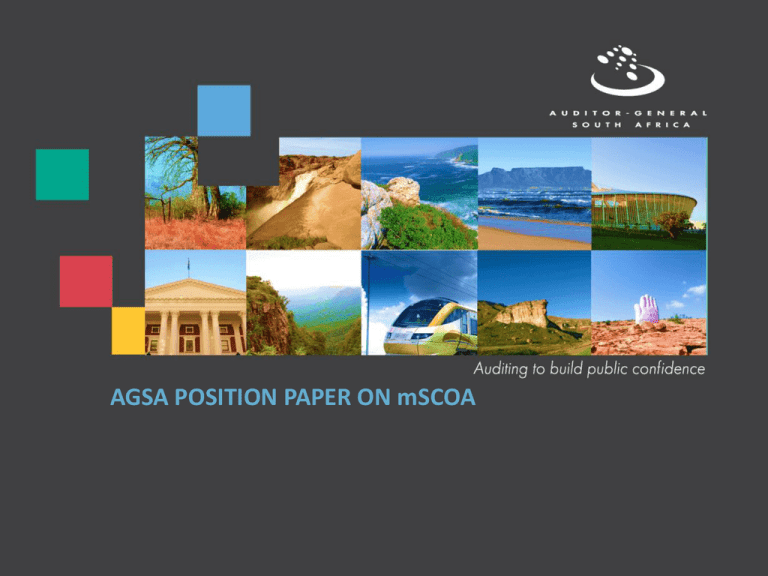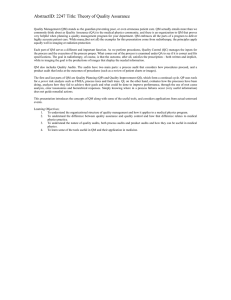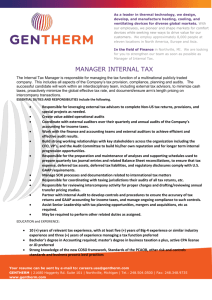Item 2_Municipal mSCOA Position Paper presentation June 2015
advertisement

AGSA POSITION PAPER ON mSCOA Reputation promise/mission The Auditor-General of South Africa has a constitutional mandate and, as the Supreme Audit Institution (SAI) of South Africa, exists to strengthen our country’s democracy by enabling oversight, accountability and governance in the public sector through auditing, thereby building public confidence. A. Background Currently, municipalities manage and report on their financial affairs in accordance with their own organisational structures and unique charts of accounts. The result is a disjuncture amongst municipalities and municipal entities and between municipalities and the other spheres of government as to how they classify transactions and balances and consequently report thereon. As a result, the Minister of Finance specified national norms and standards for the recording and collection of local government budget, financial and non-financial information. This was achieved through the municipal SCOA regulations, which were gazetted on 22 April 2014, making the application of the mSCOA in local government a legislated requirement. The mSCOA will take effect on 1 July 2017, thus impacting the 2017/18 financial statements and audits of all local government auditees. The implementation will be piloted at 26 municipalities from 1 July 2015 Purpose National Treasury (NT) is the owner of the mSCOA project, and as such is responsible for the implementation of the project. As a role-player in the public sector, the AGSA was approached by NT to discuss the manner in which the AGSA is able to support this project. Although the project will have many benefits for local government reporting, the implementation of the project in the current local government environment introduces many risks that could affect the audits. Therefore, the purpose of this paper is to set out the manner in which the AGSA plans to support and respond to the mSCOA for reform. Risks The mSCOA is a significant project, and as such poses various risks to local government, with the more important risks including the following: a. Inability of some of the current system vendors to accommodate the technical specifications of the mSCOA, which will result in significant changes to current systems and/or the implementation of new systems. b. Capacity and skill constraints on the part of the municipalities to manage the change to the mSCOA classification framework. c. Funding constraints related to implementation of the mSCOA. d. Technical complexity of the mSCOA classification framework. e. Capacity constraints within NT to ensure that adequate and timely support and implementation assistance is available to local government entities and to properly maintain the municipal SCOA. f. Constraints regarding the quality, timeliness and attendance of training programs. g. Possible impact of unfavourable outcomes from the test implementation of the mSCOA at 26 pilot municipalities. h. Insufficient support and action from provincial treasuries in the roll-out and implementation of the mSCOA. i. Budget constraints from a project assurance perspective (internal or external audit) j. Tight implementation timeframe of 1 July 2017. k. Possible errors in the migration of the current financial information to the new the mSCOA classification framework, which may also include migration to a new system; e.g. incorrect take-on balances, user errors, system failures/ errors, etc. AGSA response The AGSA has adopted the following four-fold approach in order to support and respond to the mSCOA for local government reform: Our message to local government Participation in project Our audits before implementation Our audits - after pilot phase Our message to local government The AGSA is requested at various forums (including the SCOA forum) to share its view on the mSCOA project and how it will possibly affect audit outcomes. The following actions are proposed : No Action Responsible BU/ person 1. Formulate message (slides with briefing note) ARD with assistance from that expresses support for objectives of the ISA process (without committing to auditing compliance) but raise awareness of the associated risks and how it can be addressed. Such message should elevate the role of internal audit. 2. Share message with SCOA forum, CFO forums and other stakeholders CE04 – SCOA forum Audit business unit Other forum representatives Timeline June 2015 Ongoing and as requested Participation in project NT requested the AGSA to participate in the project. The participation should be limited to the following actions: No Action Responsible BU/ person Timeline 1. Participate in SCOA forum as observers to assess status of project and provide feedback to office. ISA & ARD Ongoing 2. Frequent bi-lateral meetings with National Treasury to share information and discuss risks. CEO4 From June 2015 3. Audit of project governance processes (preimplementation review) by National Treasury. ISA and National B From July 2015 Note 1 Note: 1. Agreement on scope and fees still needs to take place between NT and AGSA Our audits - before implementation Although implementation will only affect the 2017/18 audits, the following actions will be required before implementation: No Action Responsible BU/ person Timeline 1. Raise awareness of changes in the AGSA. Use OPSCO, BE forums, PC forums and metro forum CEO4, ARD with assistance from ISA From May 2015 2. Perform a basic readiness assessment at every auditee based on the requirements from the legislation and report in management report and general report. ARD for development of assessment 2015/16 and 2016/17 audits 3. Project Assurance methodology assessment for each implementation vendor ISA 2015/2016 and 2016/17 audits 4. Audit teams at pilot municipalities to assess risks, impact and identify best practices which can be shared with other teams for implementation phase Coordinated by ARD and supported by ISA 2015/16 and 2016/17 audits 5. Data conversion audits for pilot municipalities. ISA As agreed with RA 6. Consider impact of additional IS audits on audit fees and how assurance by internal auditors can be used. ISA June 2015 Audit BUs for performing assessment Our audits - after pilot phase The following will be required for the year of implementation: No Action Responsible BU/ person Timeline 1. Data conversion audits at all auditees that changed to a new system or had major upgrades. ISA As agreed with RA 2. Perform normal financial audits, but with increased risks to be considered and where possible interim audits to be performed to early identify problems. ABUs (with guidance from ISA & ARD) 2017/18 audits Questions?



